The Museum of Funeral Customs is on the edge of Oak Ridge Cemetery, a five-minute walk from the tomb. Supposedly the fellow who swoops over to greet me is the museum director, but he speaks in the hushed low voice of a funeral director. He warns me about “the sensitive nature of our exhibits.”
Please. I actually giggle when he tries to steel me for seeing the re-created 1920s embalming room, as if I’m not wearing Bela Lugosi hair clips; as if I didn’t just buy a book for my nephew called Frankenstein and Dracula Are Friends; as if I was never nicknamed Wednesday (as in Addams); as if in eighth-grade English class, assigned to act out a scene from a biography, when all the other girls had chosen Queen Elizabeth or Anne Frank, I hadn’t picked Al Capone and staged the St. Valentine’s Day Massacre with toy machine guns and wadded-up red construction paper thrown everywhere to signify blood; as if I’m not here to see the replica of Abraham Lincoln’s casket; as if I’m not the kind of person who would visit the freaking museum of Funeral Customs in the first place. — Sarah Vowell, Assassination Vacation
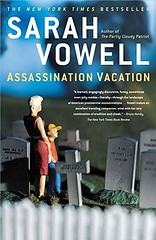 Assassination Vacation
Assassination Vacation
Sarah Vowell
![]()
Sarah Vowell brings history to life. I couldn’t say anything more trite if I tried, but it’s true, and you’ll see what I mean when you read Assassination Vacation. Which you will.
Sarah Vowell has become something of a pop culture figure, but I think of her as a serious historian, a uniquely American one. She told the story of Johnny Cash and June Carter on NPR’s This American Life; in one chapter of her book The Wordy Shipmates she taught us more about the Puritans and the Shining City on the Hill they dreamed of than we ever learned in high school and college; on The Daily Show she explained why Evacuation Day was once a bigger deal to Americans than Thanksgiving. She teaches us what we don’t know, she makes us want to learn more, she helps us realize how what happened last century and the century before that is directly related to what’s happening today.
Assassination Vacation recounts a series of trips Sarah Vowell took with family and friends to visit sites and monuments associated with the assassinations of Presidents Lincoln, Garfield, and McKinley. It’s much more than that, of course: you can’t tell the story of these killings without describing the aftermath of the Civil War and Reconstruction; the social and political movements surrounding each president and his assassin; the profound impact each killing had on the country, the American people, and those who were close to the presidents. She immerses the reader in all this, but she does it in short vignettes, with many references to current day social and political issues, as well as references to her own life, family, friends, and beliefs. Sarah Vowell is as much a part of this history as Robert Todd Lincoln, the son of Abraham Lincoln, who was there at his father’s assassination, who was standing next to Garfield when he was shot, who stepped off a train in Buffalo to visit the Pan-American Exposition moments after McKinley was shot, who was there in 1922 when the Lincoln Memorial was dedicated in Washington DC, who lives on, one becomes convinced, as Vowell’s ghostly traveling companion.
God, she’s good. Have I talked you into reading Assassination Vacation? I hope so!
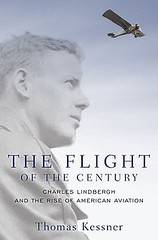 The Flight of the Century: Charles Lindbergh & the Rise of American Aviation
The Flight of the Century: Charles Lindbergh & the Rise of American Aviation
Thomas Kessner
![]()
Although I came of hero-worshipping age in the 1950s, long after Lindbergh had exposed himself as a Nazi-loving racist and anti-Semite, all I knew about was his heroic flight and a little bit about his efforts to explore routes for the budding airline industry. The bad stuff wasn’t discussed, at least in the schools I went to. I read Lindbergh’s Spirit of St. Louis not long after it was first published, and that certainly didn’t address his political side. Basically, I grew up believing Lindbergh was the real thing, a guileless American hero.
This book does much to put Lindbergh in perspective, though not enough in my opinion. It contains a great deal of information about Lindbergh’s childhood, an awful lot of information about the crushing fame that descended upon him after his New York to Paris flight, and even more information about his subsequent ties to Wall Street and the budding American aviation industry in the period after his solo Atlantic flight, back when he was indeed a hero to almost everyone.
All this is richly detailed, though repetitive in parts. But then we come to the kidnapping, Lindbergh’s voluntary exile to England, his embrace of Fascism and Nazism: for some reason Thomas Kessner squeezes all this into the final chapter, practically in outline form. Granted the subject of Kessner’s book is the flight itself, the resulting fame, and Lindbergh’s place in the development of American aviation; still I felt let down, because how can you tell just part of Lindbergh’s story?
Mainly, though, I felt let down by Lindbergh, who turned out to have feet of extraordinarily clayish clay (he was a serial bigamist too!); somewhat less let down by Kessner, who didn’t explore the second half of Lindbergh’s life with the thoroughness he displayed in exploring the first half. By the time Kessner got to Lindbergh’s aerial exploits in WWII and his later life as an environmental activist, he was down to the book’s last few pages, and dealt with the final passages of Lindbergh’s story in just two or three sentences.
Charles Augustus Lindbergh, I grew up worshipping you. I probably became a pilot because of you. Your very name meant goodness to me. Lindbergh. Like if there was a Lindbergh apple, for example, even better than a Red Delicious. And all along I had no idea what an odious person you actually were.
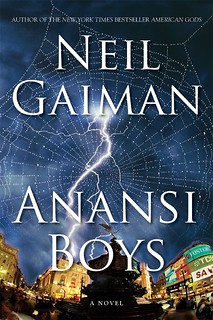 Anansi Boys
Anansi Boys
Neil Gaiman
![]()
I thought Gaiman’s The Ocean at the End of the Lane was a ripoff and said so, and right away a friend pressed a copy of Anansi Boys into my hand and said, “Read this, you’ll like it much more.” And I did, much more, but fantasy … particularly childish fantasy … is just not my thing, and as fun as Anansi Boys is to read, it’s too light altogether.
A man who’s lost touch with his id gets it back by confronting a panoply of what appear to be American Indian gods (although he himself is Afro-Caribbean … I sensed a slight disconnect there, but never mind). How does he get his id back? By besting the gods. And how does he do that? By overcoming his fear of singing in public.
Shoot, I didn’t know besting the gods was so easy. Lemme at ’em!
The characters, though generally appealing (Fat Charlie excepted … he’s surprisingly unsympathetic throughout), are paper thin, and the fantasy itself is trite. Even when Fat Charlie’s id, Spider, has his tongue ripped out by Bird Woman, he doesn’t seem to suffer much. There’s no challenge here. It’s too easy. It’s comic book stuff.
I’m not going to allow my dislike of too-easy fantasy to color my rating. Three stars for being written in an engaging, conversational style, one that will suck readers in and keep them turning pages, as it did me. If this sort of thing is your cup of tea, you’ll love it. As for me, though it was a tasty read, there was no nutrition in it and I’m still hungry.
One last, probably unfair, comment: do you follow Neil Gaiman on Twitter? I did for several months, waiting to get some sense of connection with him, but his tweets (and retweets) are strictly self-promotional. You don’t get that with authors like Margaret Atwood or William Gibson, who are also on Twitter. Just sayin’.
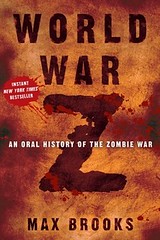 World War Z: An Oral History of the Zombie War
World War Z: An Oral History of the Zombie War
Max Brooks
![]()
I watched the movie before reading the book, but in this case no harm, no foul … the two things are entirely different. The movie follows a single hero who eventually discovers a way out of humanity’s crisis. The book is a series of oral interviews with survivors from all over the world, not one of whom was a central actor; no single factor ensured to humanity’s victory and in fact the battle is still going on in isolated parts of the world. The only similarity between the movie and the book is in the rapid spread of the zombie plague. Even the zombies are different … fast in the movie, slow but relentlessly sure in the book (I hope that doesn’t spoil it for anyone).
So have at it, readers. Go see the movie. Read the book. You’ll get a double-zombie fix. As for me, I think my zombie itch has finally been scratched away.
Now, as for the book. Surprisingly well written. You’d almost think you were reading a Studs Terkel oral history. It’s all very believable, these interviews with survivors of a global catastrophe. I gave the writing a very high rating; were I to rate the book on how compelling I found the horror premise at the heart of it, my rating would have been a little lower … zombies are fun to think about, but really, do they warrant such serious treatment?
One small criticism: I thought the book about 100 pages too long. Toward the end the survivor interviews began to blend together and I found myself skimming.
Otherwise, a fun but unserious read, excellently done, but please don’t come at me with any more zombie novels … I’ve had my fill of undead flesh for now.
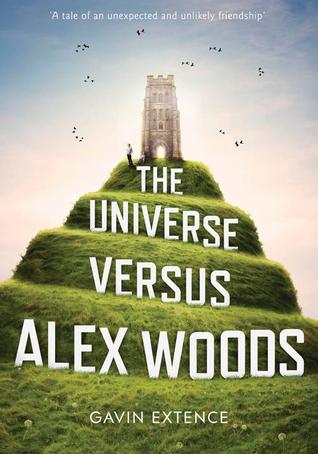 The Universe Versus Alex Woods
The Universe Versus Alex Woods
Gavin Extence
![]()
I love good YA, and this is very good YA, but it doesn’t quite rise to the 4-star level. I don’t really buy Alex Woods, and that’s my issue with this otherwise excellent story.
At the age of 10, Alex is hit on the head by a meteorite. It affects him profoundly: he’s in a coma for two weeks, and after he comes round he becomes an epileptic. Alex’s oddness … adult and calm for his age, inner-directed, not much interested in the things other people his age are interested in … is, like his epilepsy, an outcome of the meteorite, and okay, for the sake of the story I’ll buy that. But I still don’t believe Alex. I don’t believe the bullying at school doesn’t make him burn inside. I don’t believe he doesn’t have a single friend his own age. I don’t believe he doesn’t think about Ellie the way every boy everywhere thinks about girls. I don’t believe he never takes a puff of Mr. Peterson’s weed.
Otherwise I quite like Alex. I abandoned religion and embraced humanism at about the same age Alex did. I too discovered Vonnegut in my teens and devoured every book of his I could get my hands on. I too thought about moral issues and made my own decisions about what was right. I too was a very inner-directed young man. Alex is my kind of kid, only a little too perfect. The best YA, I believe, addresses the aches and desires we all experience growing up, and too much of that is missing from Alex’s story, making it a little too antiseptic.
The emotional center of Alex’s story, however, is still a powerful one. I wish I could say more about it here, but that would spoil it for others. What I mean to say is that while I wish Gavin Extence had given us a fuller picture of Alex, what he does give us is extremely moving and impactful. The closing chapter is as good as anything written by John Green … it really packs a punch.
Now get off your arse, Alex, and put some moves on Ellie. It’s time you grew up in other ways, too!
Two I Didn’t Finish
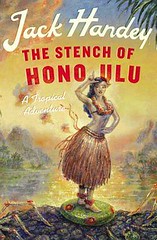 The Stench of Honolulu: A Tropical Adventure
The Stench of Honolulu: A Tropical Adventure
Jack Handy
![]()
For the longest time I thought Jack Handey was a fictional front-porch philosopher made up by the writers at Saturday Night Live. But no, he’s real, and he’s written a novel. The novel is composed of brief Jack Handeyish thought bubbles, arranged as paragraphs and strung together in a rough sort of order.
The novel purports to tell the story of a trip to Hawaii. But all it really is is a collection of one- and two-liners meant to make the reader chuckle. That reader did indeed chuckle over the first few paragraphs. Then he chuckled once per page. Then he tossed the book aside and went looking for something meaningful to read.
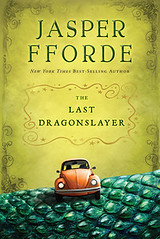 The Last Dragonslayer
The Last Dragonslayer
Jasper Fforde
![]()
A friend recommended this YA fantasy so I checked it out from the library. I once tried to get through a Jasper Fforde Thursday Next novel, again on a friend’s recommendation, and found it too cute to bear. Sadly, this was my reaction to this one as well. Fforde is sort of a Douglas Adams type: lots of wordplay, lots of semi-funny stoner conceits. But there’s just no meat here, nothing real. Not my thing at all.